ZEN IRODALOM ZEN LITERATURE
« Zen főoldal
« vissza a Terebess Online nyitólapjára
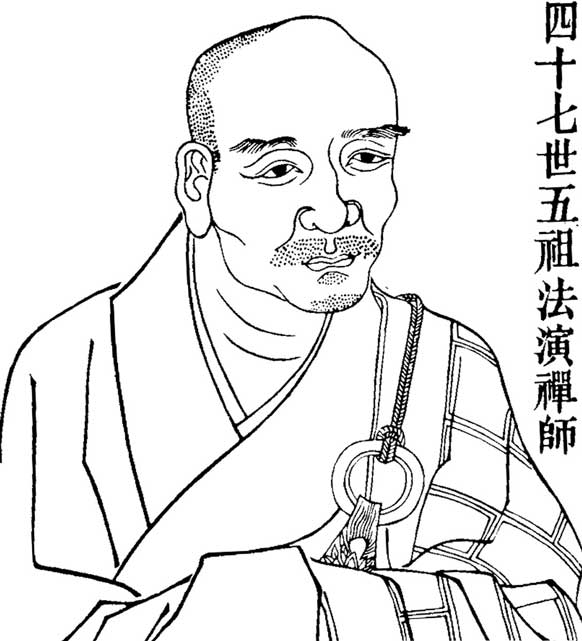
五祖 (清遠) 法演 Wuzu (Qingyuan) Fayan (1024-1104)
(Rōmaji:) Goso (Seion) Hōen
Fayan Chanshi yulu 法演禪師語錄 (Recorded sayings of Chan Master Fayan), 3 fascicles (t 47: #1995). Full title Wuzu Fayan Chanshi yulu 五祖法演禪師語錄. The sermons, verses, and inscriptions of the Chan master Wuzu Fayan 五祖法演 (1024?–1104), with prefaces dated 1095. It was fi rst published in 1098, while Fayan was still alive. Fascicle 1 consists of three series of sermons: those delivered while the master was at Mount Simian 四面 (compiled by his disciple Cailiang 才良), those delivered while he was at Mount Taiping 太平 (compiled by Qingyuan 清遠), and those delivered while he was at the temple Haihui si 海會寺 (compiled by Jingchun 景淳); fascicle 2 consists of sermons delivered at Mount Baiyun 白雲 Haihui si 海會寺; and fascicle 3 consists of sermons delivered at Mount Huangmei 黄梅, plus poems and postscripts.
Tartalom |
Contents |
| Vu-cu Fa-jen mondásaiból Fordította: Terebess Gábor |
Wuzu Fayan, "Qingyuan" |
![]()
WUZU FAYAN OU PROPAGATEUR-DE-LA-LOI-AU-MONT-DU-CINQUIÈME-PATRIARCHE (1024?-1104) (La passe sans porte, CAS 35, 36, 38, 45)
Moine de la troisième génération de la branche Yangqi de l'école de Linji. Originaire de Baxi à Mianzhou (Mianyang, Sichuan), il avait pour nom de famille Deng. Il devint moine et reçut l'ordination complète à 35 ans. Il étudia à Chengdu la théorie de l'école idéaliste du Vijñānavāda. Ayant soudain des doutes quant à cette approche, il traversa la Chine d'est en ouest et se rendit dans la région de la Huai et du Zhejiang. C'est auprès de Baiyun Shouduan (1025-1072), un disciple de Yangqi Fanghui, qu'il connut l'éveil. Il résida ensuite au mont des Nuages blancs (Baiyun shan, Anhui). Puis il s'installa au temple Chan de l'est (Dongchan si) sur le mont du Cinquième patriarche (Wuzu shan) à Qizhou (Hubei). En 1104, il monta en salle, prit congé de l'assemblée, et mourut à l'âge de 80 ans. Il eut trois disciples célèbres, dont Yuanwu Keqin (1063-1135), auteur des Annales de la falaise verte (Biyan lu). Ses dialogues ont été recueillis dans les Entretiens du maître de dhyâna Propagateur-de-la-loi (Fayan chanshi yulu) en trois rouleaux, compilés dix ans avant sa mort.
Wuzu Fayan, "Qingyuan"
by Andy Ferguson
In: Zen's Chinese Heritage: The Masters and Their Teachings, Wisdom Publications, 2011, pp. 448-451.
WUZU FAYAN (1024–1104), also known as “Qingyuan,” was a disciple of Baiyun Shouduan. He came from Baxi City in Mianzhou (now the city of Mianyang in Sichuan Province). A great transmitter of the Yangqi line of Linji Zen, Wuzu’s teaching exerted profound influence on subsequent generations of Zen teachers and on wider Song dynasty society. Leaving home to become a monk at the relatively late age of thirty-five, he traveled to Chengdu to study the doctrines of the Consciousness-Only school of Buddhism. However, Wuzu was troubled by the proposition that when a bodhisattva enters the Way, wisdom and principle are eclipsed, and though environment and mind are reportedly realized as fully united, no evidence can be offered to affirm the truth of this unity.
With this doubt in mind, Wuzu made inquiries to a Tripitaka master about the nature of knowledge. To his question he received the reply, “If a person drinks water, he personally knows hot and cold.”
While this helped to clarify Wuzu’s understanding, he still said, “Then hot and cold can be known, but what about knowledge of the self?”
Wuzu then asked (the teacher) Zhiben Jiang, “If one does not know the self, how can one understand principle?” But Jiang did not answer, and merely told him, “If you want to be clear on this, then go to the South and attach yourself to a teacher of the buddha mind doctrine.” Wuzu then left to seek out such a teacher.
Wuzu’s arduous journey led him to seek out Zen masters Yuanzhao and Fushan Fayuan, but neither of these teachers brought Wuzu to a full awakening. Before Fushan died, he directed Wuzu to travel to Baiyun Shouduan’s temple to gain instruction.
Upon meeting Baiyun, Wuzu inquired to him about a story concerning Nanquan and the Mani Jewel. Just when he finished asking this question, Baiyun shouted at Wuzu, causing him to instantly attain enlightenment. Wuzu then thanked Baiyun by offering the following verse:
Before the mountain spreads the plain.
Repeatedly, with folded hands, I asked the elders.
They sold to me so many times, and yet I purchased more,
Just to know that pine and bamboo bring forth the cloudless wind.
Wuzu’s fame as a teacher spread widely and students gathered from throughout China to study under him. He first taught at Simian Shan (“Four Face Mountain”), and then moved to Mt. Baiyun. Later he moved to the Dongchan (“East Zen”) Temple on Wuzu Mountain.209 Among Wuzu’s twenty-two Dharma heirs were the acclaimed “Three Buddhas,” the monks Foyan Qingyuan, Foguo Keqin, and Fojian Huiqin. The following passages appear in The Record of Fayan.
*
A monk asked Zen master Wuzu Fayan, “What is one drop of Baiyun?”
Fayan said, “Pounding. Grinding.”
The monk asked, “How about those who drink it?”
Fayan said, “I teach of a place where no face appears.”
*
A monk asked, “Baiyun cut off the tongues of everyone beneath heaven. But as for Baiyun’s tongue, who will cut it off?”
Wuzu said, “Old Wang in East Village.”
Wuzu then said, “It’s nothing other than ordinary affairs. But according to your thinking it’s something different. If you think you can understand through speech, then know you haven’t penetrated the truth. If you think you can’t understood through speech, then your head and mind are like a raging fire. So, just pass through Zhaozhou’s gate and cut off Baiyun’s tongue yourself. Don’t betray the ancient sages’ compassion.”
*
Fayan entered the hall. He recited the example of when a monk asked Baling Haojian, “Is the meaning of the ancestors and the meaning of the scriptures the same or different?” Baling said, “The cold fowl flies up into the tree. The cold duck dives into the water.”
Fayan said, “Old Baling! He only said one-half. Baiyun didn’t go along with his answer. Hold the water in your hands and possess the moon. Brush against the flowers and the fragrance fills your clothes.”
*
Wuzu addressed the monks, saying, “Yesterday when I went into town I noticed a puppet show going on. I couldn’t help going over there and taking a look. The puppet was really something to see! At first sight it seemed to move its limbs, walk around, and sit down all on its own. But when you looked closer, you could see that there was someone behind the blue curtain.
“I couldn’t help but call out, ‘Sir! What’s your name?’
“The man replied to me, ‘Honored Priest! Just watch the show. Why ask for names?’
“Brethren! When I heard him say this, I didn’t have a single word to say in reply, nor a single idea to espouse. Can any of you say anything in my place? Yesterday, that single instance of embarrassment has uprooted all my ideas now.”
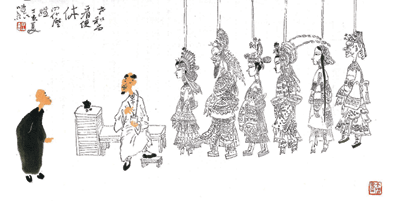
Illustration by 李蕭錕 Li Xiaokun (1949-)*
Wuzu addressed the monks, saying, “When hearing is shallow, the realization is deep. When hearing is deep, there’s no realization. What can be done? What can be done? Making a true offering to Buddha doesn’t mean giving more incense.”
*
Fayan brought up for consideration the story of when a monk asked Yunmen, “What is the talk that is beyond the buddhas and ancestors?“
Yunmen replied, “Cake.”
Fayan said, “I don’t answer that way. If someone suddenly asks me, ‘What is the speech that is beyond the buddhas and ancestors?’ I’d just reply to him, ‘Donkey shit is like horse shit.’ Or I’d say, ‘Worn-out reed sandals.’ Or I might say, ‘The Tortoise God drags his tail.’ So now I ask you, are my answers the same or different than Yunmen’s? Consider this question.”
*
A monk asked Wuzu Fayan, “What was the meaning of Bodhidharma’s facing the wall?”
Wuzu said, “It still hasn’t been calculated.”
The monk asked, “What about when the Second Ancestor stood in the snow?”
Wuzu said, “An error is an error.”
*
A monk asked, “At the top of a hundred-foot pole, how does one go forward?”
Wuzu said, “Quick, try it and see!”
*
A monk asked, “What is the affair of the Linji school?”
Wuzu said, “Five rebels hear thunder.”
The monk asked, “What is the affair of the Yunmen school?”
Wuzu said, “The red flag is brilliant.”
The monk asked, “What is the affair of the Caodong school?”
Wuzu said, “Riding books you won’t get home.”
The monk asked, “What is the affair of the Guiyang school?”
Wuzu said, “A broken monument across the ancient road.”
The monk then bowed.
Wuzu said, “Why don’t you ask about the Fayan school?”
The monk said, “I leave it to the master.”
Wuzu said, “A thief in the night!”
*
The Wudeng Huiyuan offers an account of Fayan’s death.
On the twenty-fifth day of the sixth month of [the year 1104], Wuzu entered the hall and bade the monks farewell, saying, “Zhaozhou had some final words. Do you remember them? Let’s see if you can recite them.”
When no one responded, Wuzu then recited Zhaozhou’s words:
Fortune few among the thousand,
But one has countless pains and sorrows.Then Wuzu said, “Take care.”
Later that night Wuzu died. It is recorded that a great rock fell down nearby Mt. Xi, creating a sound heard for forty miles.
Wuzu Fayan's Dharma Lineage
[...]
菩提達磨 Bodhidharma, Putidamo (Bodaidaruma ?-532/5)
大祖慧可 Dazu Huike (Taiso Eka 487-593)
鑑智僧璨 Jianzhi Sengcan (Kanchi Sōsan ?-606)
大毉道信 Dayi Daoxin (Daii Dōshin 580-651)
大滿弘忍 Daman Hongren (Daiman Kōnin 601-674)
大鑑慧能 Dajian Huineng (Daikan Enō 638-713)
南嶽懷讓 Nanyue Huairang (Nangaku Ejō 677-744)
馬祖道一 Mazu Daoyi (Baso Dōitsu 709-788)
百丈懷海 Baizhang Huaihai (Hyakujō Ekai 750-814)
黃蘗希運 Huangbo Xiyun (Ōbaku Kiun ?-850)
臨濟義玄 Linji Yixuan (Rinzai Gigen ?-866)
興化存獎 Xinghua Cunjiang (Kōke Zonshō 830-888)
南院慧顒 Nanyuan Huiyong (Nan'in Egyō ?-952)
風穴延沼 Fengxue Yanzhao (Fuketsu Enshō 896-973)
首山省念 Shoushan Shengnian (Shuzan Shōnen 926-993)
汾陽善昭 Fenyang Shanzhao (Fun'yo Zenshō 947-1024)
石霜/慈明 楚圓 Shishuang/Ciming Chuyuan (Sekisō/Jimei Soen 986-1039)
楊岐方會 Yangqi Fanghui (Yōgi Hōe 992-1049)
白雲守端 Baiyun Shouduan (Hakuun Shutan 1025-1072)
五祖法演 Wuzu Fayan (Goso Hōen 1024-1104)
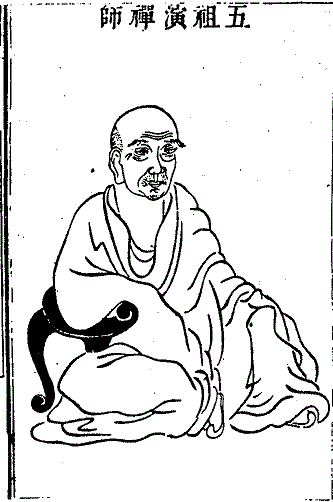
Vu-cu Fa-jen összegyűjtött mondásaiból
Fordította: Terebess Gábor
Vö.: Folyik a híd, Officina Nova, Budapest, 1990, 75-76. oldal
Vu-cu Fa-jen így szólt tanítványaihoz:
– Ha megkérdik tőlem, hogyan lehet elsajátítani a csant, azt mondom, mint a betörés tudományát: a betörő fia egy nap aggodalmaskodni kezd, ideje lenne kitanulni öreg apja mesterségét, mert maholnap betevő rizs nélkül maradhatnak. Az öreg rá is áll, és egy éjszaka elviszi magával. Áttörik egy udvarház kerítését, behatolnak az egyik szobába, ahol a betörő biztatja a fiát, másszon be a ruhásládába, és adogassa ki, amit talál benne. Alighogy bebújik, az apja hirtelen rázárja a láda fedelét. Aztán, mint aki jól végezte dolgát, kisétál az udvarra, éktelen lármát csap, majd kisurran a kitört kerítésen. A háziak izgatottan szaladgálnak égő gyertyával a kezükben, de úgy látják, hogy a betörők már elszeleltek. A fiú ezalatt apját kárhoztatja a láda mélyén. Hirtelen támad egy mentőötlete: patkányrágcsálást utánoz. Utasítják is a szolgálólányt, nézzen utána. Végre kireteszeli a láda tetejét, a fiú kiugrik, elfújja a gyertya lángját, félrelöki a lányt, és elmenekül. Persze rohannak utána. Az út mentén észrevesz egy kutat, talál mellette egy nagy követ, és beleveti. A csobbanásra az üldözők a kút köré gyűlnek és találgatják, odaveszett-e a betörőjük. A fiú időközben bizton hazaér, és apjára támad, miért juttatta ilyen kelepcébe. „Ne dohogj, fiam – inti az apja –, csak azt mondd el, hogy sikerült elmenekülnöd.” Amikor a fiú elmeséli viszontagságait, az öreg felkiált: „Látod, megtanultad te a mesterséget!”
Vu-cu Fa-jen egyszer azt kérdezte:
– Ha bölcs emberrel találkozol az úton, se nem szólhatsz, se nem hallgathatsz. Hogy köszöntöd?
Vu-cu Fa-jen mondott egy példát:
– Olyan, mintha bivaly ballagna el az ablakrács előtt. Áthalad a feje, a szarva, mind a négy patája – de a farka miért nem jut át soha?
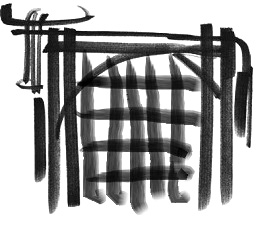
Az illusztráció Han Meilin (韓美林 1936-) tusrajzának felhasználásával készült
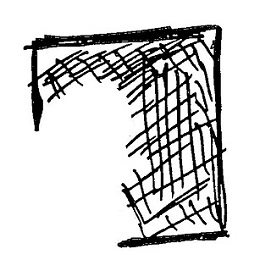
Kara Winwood rajza
– Van-e különbség a pátriárkák és a Buddha tanítása között? – kérdezte egy szerzetes.
– Meríts vizet, és markodban a hold virul; szedj virágot, és köntösöd megillatosul – felelte Vu-cu Fa-jen.
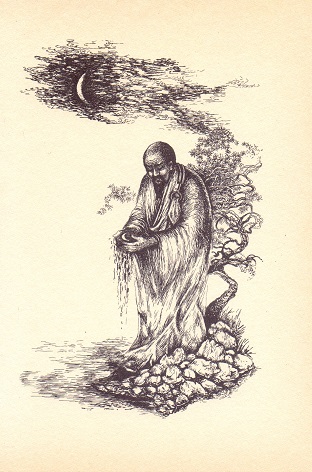
Lacza Márta illusztrációja